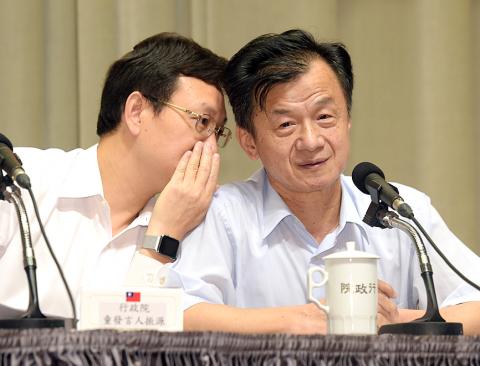A Ministry of Justice agreement to abolish the Special Investigation Division (SID) is based on confidence that the amendment to the Organic Act for Courts (法院組織法) would further empower district prosecutors’ offices and the high prosecutor’s offices to the level that each office would be a literal “mini-SID,” Minister of Justice Chiu Tai-san (邱太三) said yesterday.
The ministry has agreed with Democratic Progressive Party (DPP) Legislator Tsai Yi-yu’s (蔡易餘) proposal to abolish the SID and it is expected to be phased out by October, the Legislative Yuan said.
According to Chiu, the SID had to constantly “borrow” district and high-prosecutor office staff to conduct investigations, adding that there was no need for the SID when district prosecutors are capable of handling investigations into cases of corruption.

Photo: Hunag Yao-cheng, Taipei Times
The SID did not begin prosecution against high-level officials, as minster-level officials were prosecuted prior to the creation of the SID in 2007, Chiu said, adding that the division overshadows other prosecutorial units.
The public should have the same confidence in district prosecutors’ offices as they do in the SID, Chiu said.
Chiu used examples of district prosecutors’ offices and the Agency Against Corruption (AAC) investigating corruption cases in New Taipei City, the former Taoyuan County and Nantou County together.
The ministry will be instructing local prosecutors’ offices to increase efforts to combat corruption, and the draft amendments to the Organic Act for Courts submitted to the legislature will enable those offices to “borrow” staff from other branches should their expertise be required in corruption investigations, Chiu said.
Dissolving the SID should not affect the capability and efficiency of anti-corruption investigations, Chiu said, adding that he has confidence in the district prosecutors’ offices capabilities.
The SID has the power to launch investigations against the president, vice president, presidents of government branches, minister-level officials and generals.
Chiu said that the AAC was also unnecessary, but was motivated by political factors, adding that the AAC has also strained judicial relations due to overlapping jurisdictions.
However, Chinese Nationalist Party (KMT) Legislator Alicia Wang (王育敏) said the DPP was ignoring the rule of law, adding that the establishment of the SID was backed by law and should not be removed on the whim of one administration.
DPP legislators want to remove the SID because it has been responsible for many corruption investigations against former president Chen Shui-bian (陳水扁), Wang said, adding that the motion to abolish the SID is politically motivated.
DPP Legislator Huang Wei-cher (黃偉哲) said the KMT’s comments were purely political, adding that the party has been the beneficiary of the division since its establishment.
The division has investigated members of both parties and the difference is simply whether the investigation proves there is a valid case or not, Chiu said, adding that the ministry is approaching the issue from the point of what function the division serves in maintaining the rule of law.

‘DENIAL DEFENSE’: The US would increase its military presence with uncrewed ships, and submarines, while boosting defense in the Indo-Pacific, a Pete Hegseth memo said The US is reorienting its military strategy to focus primarily on deterring a potential Chinese invasion of Taiwan, a memo signed by US Secretary of Defense Pete Hegseth showed. The memo also called on Taiwan to increase its defense spending. The document, known as the “Interim National Defense Strategic Guidance,” was distributed this month and detailed the national defense plans of US President Donald Trump’s administration, an article in the Washington Post said on Saturday. It outlines how the US can prepare for a potential war with China and defend itself from threats in the “near abroad,” including Greenland and the Panama

A wild live dugong was found in Taiwan for the first time in 88 years, after it was accidentally caught by a fisher’s net on Tuesday in Yilan County’s Fenniaolin (粉鳥林). This is the first sighting of the species in Taiwan since 1937, having already been considered “extinct” in the country and considered as “vulnerable” by the International Union for Conservation of Nature. A fisher surnamed Chen (陳) went to Fenniaolin to collect the fish in his netting, but instead caught a 3m long, 500kg dugong. The fisher released the animal back into the wild, not realizing it was an endangered species at

The High Prosecutors’ Office yesterday withdrew an appeal against the acquittal of a former bank manager 22 years after his death, marking Taiwan’s first instance of prosecutors rendering posthumous justice to a wrongfully convicted defendant. Chu Ching-en (諸慶恩) — formerly a manager at the Taipei branch of BNP Paribas — was in 1999 accused by Weng Mao-chung (翁茂鍾), then-president of Chia Her Industrial Co, of forging a request for a fixed deposit of US$10 million by I-Hwa Industrial Co, a subsidiary of Chia Her, which was used as collateral. Chu was ruled not guilty in the first trial, but was found guilty

The Chinese Nationalist Party (KMT) is maintaining close ties with Beijing, the Democratic Progressive Party (DPP) said yesterday, hours after a new round of Chinese military drills in the Taiwan Strait began. Political parties in a democracy have a responsibility to be loyal to the nation and defend its sovereignty, DPP spokesman Justin Wu (吳崢) told a news conference in Taipei. His comments came hours after Beijing announced via Chinese state media that the Chinese People’s Liberation Army’s Eastern Theater Command was holding large-scale drills simulating a multi-pronged attack on Taiwan. Contrary to the KMT’s claims that it is staunchly anti-communist, KMT Deputy